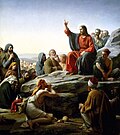
Back متهودون (مسيحية) Arabic متهودون (مسيحيه) ARZ Judaïtzant Catalan Judaisierer German Judaizante Spanish Judaïsant French מתייהדים (נצרות) HE Yudaiser ID Giudaizzante Italian 유대주의자 Korean
| Part of a series on |
| Jewish Christianity |
|---|
 |
The Judaizers were a faction of the Jewish Christians, both of Jewish and non-Jewish origins, who regarded the Levitical laws of the Old Testament as still binding on all Christians.[1] They tried to enforce Jewish circumcision upon the Gentile converts to early Christianity and were strenuously opposed and criticized for their behavior by the Apostle Paul, who employed many of his epistles to refute their doctrinal positions.[1][2][3][4]
The term is derived from the Koine Greek word Ἰουδαΐζειν (Ioudaizein),[5] used once in the Greek New Testament (Galatians 2:14),[6] when Paul publicly challenged the Apostle Peter for compelling Gentile converts to early Christianity to "judaize".[7][8] This episode is known as the incident at Antioch.
Most Christians believe that much of the Old Covenant has been superseded, and many believe it has been completely abrogated and replaced by the Law of Christ.[9] The Christian debate over judaizing began in the lifetime of the apostles, notably at the Council of Jerusalem and the incident at Antioch.[2][3] It has been carried on parallel to continuing debates about Paul the Apostle and Judaism, Protestant views of the Ten Commandments, and Christian ethics.
- ^ a b Cross, F. L.; Livingstone, E. A., eds. (2005). The Oxford Dictionary of the Christian Church (3rd Revised ed.). Oxford: Oxford University Press. p. 912. doi:10.1093/acref/9780192802903.001.0001. ISBN 978-0-19-280290-3.
- ^ a b Dunn, James D. G. (Autumn 1993). Reinhartz, Adele (ed.). "Echoes of Intra-Jewish Polemic in Paul's Letter to the Galatians". Journal of Biblical Literature. 112 (3). Society of Biblical Literature: 459–477. doi:10.2307/3267745. ISSN 0021-9231. JSTOR 3267745.
- ^ a b Thiessen, Matthew (September 2014). Breytenbach, Cilliers; Thom, Johan (eds.). "Paul's Argument against Gentile Circumcision in Romans 2:17-29". Novum Testamentum. 56 (4). Leiden: Brill Publishers: 373–391. doi:10.1163/15685365-12341488. eISSN 1568-5365. ISSN 0048-1009. JSTOR 24735868.
- ^ Klutz, Todd (2002) [2000]. "Part II: Christian Origins and Development – Paul and the Development of Gentile Christianity". In Esler, Philip F. (ed.). The Early Christian World. Routledge Worlds (1st ed.). New York and London: Routledge. pp. 178–190. ISBN 9781032199344.
- ^ Murray, Michele (2004). Playing a Jewish Game: Gentile Christian Judaizing in the First and Second Centuries CE. Waterloo, Canada: Wilfrid Laurier University Press. p. 3. ISBN 978-0889204010.
- ^ Greek New Testament, Galatians 2:14 ἀλλ᾽ ὅτε εἶδον ὅτι οὐκ ὀρθοποδοῦσιν πρὸς τὴν ἀλήθειαν τοῦ εὐαγγελίου εἶπον τῷ Πέτρῳ ἔμπροσθεν πάντων Εἰ σὺ Ἰουδαῖος ὑπάρχων ἐθνικῶς ζῇς καὶ οὐκ Ἰουδαϊκῶς τί τὰ ἔθνη ἀναγκάζεις Ἰουδαΐζειν.
- ^ Dunn, James D. G. (Autumn 1993). Reinhartz, Adele (ed.). "Echoes of Intra-Jewish Polemic in Paul's Letter to the Galatians". Journal of Biblical Literature. 112 (3). Society of Biblical Literature: 462. doi:10.2307/3267745. ISSN 0021-9231. JSTOR 3267745.
Galatians 2:14: "how is it that you compel the Gentiles to judaize?" "To judaize" was a quite familiar expression, in the sense "to live like a Jew", "to adopt a distinctively Jewish way of life"-with reference to Gentiles taking up Jewish customs like observance of the sabbath. The polemical note sounds in the verb "compel". [...] The element of compulsion would enter because there were Gentiles who were making claims, or for whom claims were being made, to enter into what generations of Jews had always regarded as their exclusive privileges (in terms of the argument of Galatians, into the direct line of inheritance from Abraham). To safeguard the character of these privileges it was evidently seen as necessary to ensure that such claimants conformed fully to the traditional notes of the covenant people. This Paul regarded as compulsion.
- ^ Michele Murray Playing a Jewish Game: Gentile Christian Judaizing in the First and Second Centuries CE, Canadian Corporation for Studies in Religion, 2004, p. 33: "From Paul's perspective, by withdrawing from Gentile table fellowship, Peter was sending a message to the Gentile believers of Antioch. The message to Antiochene Gentile Christians was that they were to judaize."
- ^ Donaldson, Terence L. (2016). "Supersessionism and Early Christian Self-Definition" (PDF). JJMJS. 3: 2–3.
© MMXXIII Rich X Search. We shall prevail. All rights reserved. Rich X Search